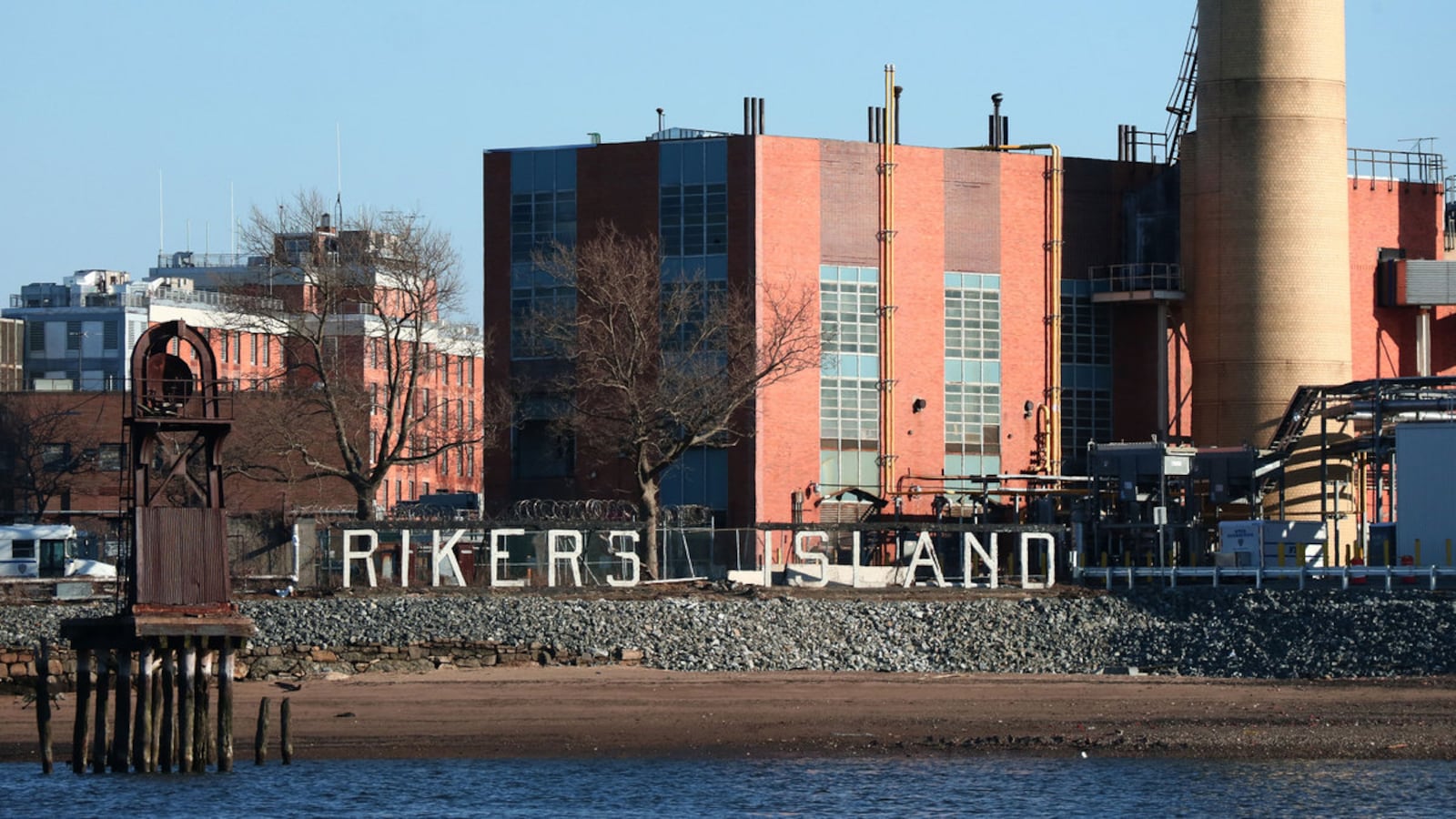“What we’re hearing now is: ‘Everybody is getting sick.’”
For months, Elizabeth Fischer and other public defenders in New York City have been arguing for the release of inmates from the notorious jail on Rikers Island, pointing to documented issues with the staffing of corrections officers and timely medical care. But even during a uniquely violent year behind bars—16 people have died in city jails, the most since 2016—those arguments haven’t always been very successful.
What is new right now, she said, is a level of anxiety and fear that is reminiscent of the earliest days of the pandemic, fueled by the rapid spread of the Omicron variant of the novel coronavirus in New York City and beyond.
“What could we possibly do? What haven’t we tried?” Fischer, an attorney for the Neighborhood Defender Service of Harlem, asked in an interview.
After a dire warning on Tuesday from the commissioner of the New York City Department of Correction (DOC) about a surge in COVID-19 cases among inmates at Rikers Island, attorneys representing incarcerated defendants wonder why the alarm wasn’t sounded sooner. They also painted a picture of a population that was uniquely vulnerable to a new variant, one that has even triple-vaccinated residents outside jail walls living in fear.
“This variant hit at a moment when the Rikers medical system was in collapse,” Corey Stoughton, an attorney with the Legal Aid Society, told The Daily Beast. “That is just one of the things that makes this such a disaster.”
Stoughton, who said the majority of her clients are incarcerated at Rikers, added that for the last six months, she’s heard an “endless stream” of complaints about violence in the jail and a lack of medical care. But in recent days, she’s heard more from clients who have tested positive for COVID-19 and are now concerned they might not get the attention they need.
“We’re very worried that as those infections start to escalate,” she said, “the system won’t be able to deliver care.”
The concern is shared by experts, who say tight spaces, less than ideal safety protocols, low rates of vaccinated inmates in the jail, and a propensity for inmates to have underlying medical conditions could produce a grim situation. “This is a sort of tinderbox for an uncontrolled outbreak of coronavirus,” Seth Prins, an assistant professor of epidemiology at Columbia University, told The Daily Beast.
In a letter on Tuesday, Vincent Schiraldi, Commissioner of the New York City Department of Correction, said that while much of New York might be spared Omicron’s worst effects due to high vaccination rates, only 45 percent of inmates at Rikers have had even one vaccine shot.
Schiraldi added that earlier this month, positivity rates in the jail had been steady around 1 percent. But by Monday, it had jumped to 9.5 percent, and by Tuesday it was 17 percent.
According to data from Correctional Health Services, the city agency tasked with medical care at local jails, as of Wednesday, the rate had increased to 21.5 percent. In a statement to The Daily Beast, a spokesperson with Correctional Health Services said they have not had a “laboratory-confirmed” case of the Omicron variant yet, but they have noted an increase in positive cases as the variant has spread locally. The CDC recently estimated the new variant accounts for some 73 percent of all cases nationally.
<p><strong><em>Do you know something we should about the coronavirus and justice? Email Andrew.Boryga@thedailybeast.com or reach him securely via Signal at 978-464-1291.</strong></em></p>
The troubling rise indicates “the risks to the human beings in our custody are at a crisis level,” Schiraldi wrote in his letter. “All indications suggest that our jail population faces an equal or greater level of risk from COVID now as it did at the start of the pandemic.”
In his letter, Schiraldi said DOC was doing all it could to limit the spread of the virus, including suspending congregate services and in-person visitation. But he implored public defenders to ask courts to consider “every available option” to reduce the jail population—including seeking supervised release, seeing if cases can be resolved with modified sentence lengths, or requesting release for people with underlying medical conditions.
In a statement provided to The Daily Beast, the Department of Correction said it has continued to encourage people in custody to get vaccinated. A spokesperson highlighted messaging in weekly newsletters, posters, flyers and a $100 commissary credit and a $100 grocery-store gift card for a person of their choice in the community, as well as tablet video messages from Dr. Anthony Fauci, Orange is the New Black author Piper Kerman, and Mets legend Mookie Wilson.
In response to concerns about staffing shortages and access to medical services, the statement pointed to early December data that showed signs of “gradual improvement” in use of force rates by correctional staff and violence among inmates. The statement also pointed to rising vaccination rates among correctional staff and said that, as of Dec. 6, 83 percent of corrections staff were vaccinated and 93 percent of non-uniformed staff were vaccinated.
Fischer, the attorney in Harlem, said Schiraldi’s letter was “startling”—but added that “in the end, the power is not in our hands to release people,” nodding at the outsized role prosecutors play.
In a statement to The Daily Beast, a spokesperson for Queen’s District Attorney’s Office said they were currently reviewing cases to see if defendants could be released “without jeopardizing public safety.” That includes looking at advanced cases where defendants can be sentenced or take a plea that results in transfer to state prison, time served, or other alternatives, they added.
A spokesperson for the Bronx District Attorney’s Office told The Daily Beast that they have been consistently evaluating the possibility of releasing defendants throughout the pandemic and will continue to do so. In a statement to The Daily Beast, a spokesperson with the Manhattan District Attorney’s Office said that in light of the recent spike in Rikers, they will “scrutinize cases where bail has been set, with the goal of recommending the release of certain individuals charged with misdemeanors or non-violent felonies who do not present a clear threat to public safety.”
The Brooklyn District Attorney’s Office and Staten Island District Attorney’s Office did not respond to requests for comment.
Ilona Coleman, the legal director of criminal defense for the Bronx Defenders, said that while district attorneys play a big role in helping clients get released from Rikers, judges also factor heavily into the equation.
Although Coleman appreciated Schiraldi’s letter earlier this week, she, too, wondered what public defenders could do differently to convince judges to release inmates based on COVID-related arguments that she said have, thus far, been less than effective.
“Oftentimes in our bail applications, we’re shut down by judges from even making that argument,” she told The Daily Beast. “There is a real dismissiveness on the part of the judiciary when it comes to arguments around the COVID-19 crisis at Rikers Island and what’s happening there.”
In addition to asking for a review of bail in cases that have already passed the initial processing stage, Coleman said, the only other option attorneys have is moving for a writ of habeas corpus. In those cases, the argument is that an inmate’s due process has been violated as a result of the conditions of their custody and a deliberate indifference by the Department of Correction to their health.
But Coleman said those arguments have often fallen flat before judges and that she was “extremely skeptical” that will change—even after Schiraldi’s letter.
Omicron is far from the first menace to threaten New York jails this year.
Since the summer, Rikers Island and the Department of Correction at large have been dealing with a massive shortage of corrections officers, along with viral videos of inmates being attacked with little help from guards and concerns from a federally appointed court monitor about the safety of inmates. Access to medical care has also been a lingering concern, according to Stoughton, the Legal Aid attorney.
In a September letter obtained by The Daily Beast, Ross MacDonald, chief medical officer for Correctional Health Services—the city agency tasked with medical care at local jails—wrote the New York City Council and Criminal Justice Committee requesting “urgent assistance.”
In the letter, MacDonald urged the council to ask for outside help to “stabilize a situation that has resulted in death and threatens the health and well-being of everyone who works and resides in city jails.” MacDonald cited slow times in processing new admissions to the jail and overcrowded pens where people are held “for days on end.”
He also warned that the jail was “poorly positioned” to control COVID transmission: “In many instances we are not able to transfer newly diagnosed patients to isolation settings for more than 24 hours and sometimes several days after diagnosis.”
MacDonald said that plans to address absent correctional officers were a good start, but they were not enough to address the “urgency” of the situation. “Faster intervention is required to minimize further injury, illness, and loss of life and this requires outside help. Decarceration efforts, which are a proven public health response to COVID-19, have not been meaningfully pursued since 2020. Rather, the city focuses on case processing through the courts, a slow remedy which also does not meet the urgency of the moment.”
MacDonald did not respond to a request for comment.
Prins, the Columbia epidemiologist, said he believes the coming days and weeks ahead could be troubling for Rikers, as well as New York City, if the population isn’t reduced and safety protocols put into place.
Even as the city and much of the country have been spooked by the new variant, hopes that it may prove less severe have been bolstered in no small part by robust local vaccination rates, many residents having had booster shots. The situation behind bars is a much more urgent one, and Omicron’s high transmission rate—even among vaccinated individuals—could mean trouble for the rest of America’s largest city.
After all, corrections officers do not live on the island.
“Anything that happens inside of Rikers is very likely to make the situation worse for all of New York City,” he said.







